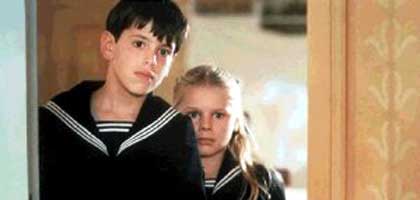
Stealing Beauty

Ingmar Bergman's huge body of films retains a fascination few other directors' work can rival. So much so that he is featured in these pages more often than most. Yet it was still a welcome surprise that his long family saga Fanny and Alexander came third in our poll of best films from the last 25 years. Now, as the National Film Theatre is preparing its long-awaited full retrospective to run in January and February, we ask Terence Davies, Lukas Moodysson, Thomas Vinterberg and Gillies MacKinnon to describe the Bergman scenes that have meant most to them. Interviews by Geoffrey Macnab.
Lukas Moodysson: Fanny and Alexander
The first time I saw Fanny and Alexander I was ten or twelve years old. I saw it first at the movies, and then I watched the long version (which is better) on television around Christmas time. I was home alone, crying in the kitchen because I felt so sorry for Alexander. I suppose I identified a bit with him - I guess I was really feeling sorry for myself.
It was the scene where Alexander has lied in school - he's said he's from a circus family and now he's going to be taught right from wrong by his stepfather. It's a scene about justice and imagination and falsehood and truth and power - and about never, not even when you've lost, letting yourself down. I don't have a clue about its technical qualities. I seldom think about things like that. The same goes for the acting - if it's good you don't think about it, you're just pulled into the universe of the film. I've often wondered what happened to Bertil Guve, the boy who played Alexander: where does he live, what does he look like, what work does he do? But I don't think I want to know.
The scene isn't typical of Bergman. There's a warmth and love that's sometimes missing from his other films. It's also unusually political: it's about the oppressing of a dissident by a person in power.
I like Bergman, but I don't think he's inspired me much. I've possibly been inspired by his attitude as an artist, which is that he takes himself completely seriously despite working within an artform that's often stupid and infantile.
Gillies MacKinnon: Persona
I first saw Bergman's films at Glasgow School of Art's film society. I must have been about 18 and I'd never seen anything like them before. There was something complex about them - they were like novels but in pictures. They left you thinking. At art school film was seen as second rate, but I guess that's where I realised I wanted to be a film-maker.
There was one scene in Persona that really struck me: it's when the nurse delivers the letter the actress has written. She stops the car and reads it. She realises the actress is writing about her with contempt - as "this sweet little nurse who is maybe a little bit in love with me." Then she returns to the house. She breaks a glass, I think, and leaves it on the doorstep and the actress walks in and out of the house with bare feet. You know she's going to stand on the glass - she doesn't the first time but then she goes back and stands on it. It's a wide shot and there's a cruelty about it. The nurse really adores this person and this person has betrayed her so she leaves a trap for her.
I remember the faces in Persona, the way he used big close-ups and big wide shots, the tracking shots and the way he used sound. I seem to remember him cutting out sound - you'd see the ocean behind the figures of the women and the sound of the ocean wouldn't be there. There were all kinds of things happening which reminded me that cinema wasn't necessarily what Hollywood had brought me up with, much as I loved all that.
There are certain film-makers I look at when I'm going to make a movie, even if there's no direct connection with the story I'm going to tell. Bergman is one, Tarkovsky the other. I've not watched Persona from beginning to end for a number of years, but I dip in and out of it. It was one of the films I looked at when I was making my new film Pure. At dinner time, when I went into my wee trailer and had a few moments to myself, I used to put on scenes from Bergman and Tarkovsky. There's that dreamy sequence in Persona where the actress comes into the nurse's room at night, drifts in like a spirit. There was no particular reference to the scene in the movie I was making, but I watched it again and again. It's an emotional reaction. It's to do with putting you in the right state of mind to deal with the problems in the film you're making.
Terence Davies: Cries and Whispers
I can't remember when I first saw Cries and Whispers. I think it was on television. The history of the film is that Bergman had the idea for the scenario in a dream - he saw these women wandering around in a red room.
After the sister dies and the other sisters go to look at her, Liv Ullmann sits on the bed and you see the sister's dead hands come up and grab her face. The obvious interpretation is that the dead exercise more power over us than the living - I assume there's a metaphorical meaning though the one I've extracted is rather superficial. In any case, it's very surreal and frightening. It's shot as if it's pure realism, which gives it a feeling of being both real and nightmarish. A dead person tries to hold on to you - it's an extraordinary moment.
The maid holds the dead woman. She's like mother earth, she can accept it. She seems able to accept everything with absolute equanimity - it's almost beatific. The sisters can't accept it because the relationships between them are so fraught. Nothing is said openly but clearly it's a very unhappy family.
Bergman does three things: he shows us the actual death, which is very painful, not an easy death; then the dead sister is washed and dressed and everything is made to look perfect, as if she's merely asleep, so death becomes decorous; but then that decorousness is broken because she appears to come back to life. So there's the agony of death, the way we try to prettify it because it's too horrible to contemplate and then the dead coming back to haunt us and exercise their power over us.
I've never really thought about the way Bergman uses the colour red so heavily. Perhaps it's the colour of blood, which is life-affirming but also claustrophobic and enclosing. Perhaps he's trying to say that the life blood of the family is its very dysfunction. I've no idea what the metaphor is - I just accepted it.
It's only when you've gone through the entire film that you realise how powerful and surreal it is. The end scene shows the sisters - all in white, all in a park - and the woman who has died says: "The people I am most fond of in all the world are with me." It's heartbreaking. You assume what you've seen is a flashforward not a flashback.
At one point you see the Liv Ullmann character gently touching the maid's face, having already decided to get rid of her. You realise what a monster Ullmann's character is - she appears to be loving and gentle but she's terrifying, manipulative and cruel. Perhaps that's what the film is about.
I don't regard Bergman as a religious film-maker. I think he's an atheist and he's saying that there's nothing beyond this life. But that doesn't stop him from being spiritual and humanist.
When I was a child, between five and seven, my father died of cancer at home. It took him two years to die. So I saw someone in agony, dying over two years. It had a very profound effect on me. He hadn't paid any National Insurance so my mother didn't get any widow's benefit. And I had to sleep in the bed he died in, which was quite traumatic for a seven-year-old. The scene in Cries and Whispers reawakens that terror.
Thomas Vinterberg: Fanny and Alexander
We did a steal from Bergman in Festen. I can confess to that. At one point they dance around the house in a chain dance, which Bergman did in Fanny and Alexander. But they also did it in Visconti's The Leopard - so Bergman stole it too.
I love Fanny and Alexander so much. It's my childhood. That's what people keep saying about Festen - they think it's a portrait of their own lives. With Fanny and Alexander I get that feeling especially from the chain-dance scene - it's like a picture of my upbringing in a commune in Copenhagen. All the hippies ran around at Christmas time all over the house. It was the very same ceremony.
I'd also like to comment on a scene from Bergman's real life. I heard a rumour he was in a shit-house in Sweden. There's this hole and he's sitting there and his foot is paddling through some old newspapers. On one of the front pages he finds some of his actors and they're holding the Palme d'Or in their hands - that's how he found out he'd won. It's a role-model situation for life as a film-maker.
Fanny and Alexander is one of his most sentimental and least consequential films. You can say others are closer to being masterpieces, but Fanny and Alexander had a great effect on me emotionally. You could say it's his worst film - it was made for television, it's very sentimental, it's a mix of genres. Other films have more authority, but it's Fanny and Alexander I really like. It wins my little race of Bergman films.
